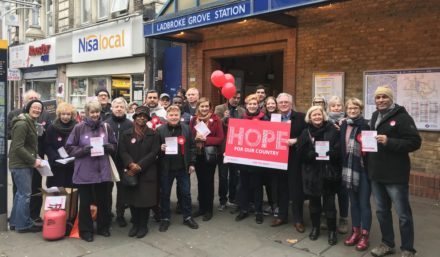
Quam bonum in Unum habitare. How good it is to live in unity.
It is hard to know whether Kensington & Chelsea’s borough motto was intentionally ironic, or contained a modicum of truth when it was first adopted many decades ago.
Either way, it is difficult to imagine a community in modern Britain that is more obviously unequal. It may be the smallest borough in London, but Kensington & Chelsea is home to the extremes of wealth and poverty, opportunity and deprivation, aspiration and despair.
When the average price of a two-bedroom flat is £1.6m, and a semi-detached home will likely set you back a staggering £7.7m, any sense of ‘unity’ is understandably lost on those who can no longer afford to live in the borough they call home. A recent report on inequality in Kensington found the life expectancy of a man living in Knightsbridge is now 94 years. The same man living less than three miles away in Latimer Road can expect to reach 72. Average household incomes, access to health and social care provision, levels of deprivation and child poverty – the list is endless, but each measure tells the same story.
For many, such grotesque levels of inequality have come to be encapsulated in the tragic Grenfell Tower fire in June last year. It seems incomprehensible that 71 people could lose their lives in such a horrific and avoidable manner, but inconceivable that it would ever happen in the luxury tower blocks just a stone’s throw away.
And yet despite being a borough of two halves, Kensington & Chelsea has long been considered a Tory ‘gimme’. In spite of strong Labour support in its northern wards, staunchly Conservative areas in the south were always able to ensure that control of the council – as well as the two parliamentary seats that make up the borough – remained blue. Well, until recently.
Emma Dent Coad’s victory at the general election last year was undoubtedly one of Labour’s most exciting – and unexpected – gains. Her success has bred a growing sense among members and activists that the political landscape is shifting. With the local elections now just days away, there is a renewed optimism and energy to Labour’s campaign here.
Wards that once struggled to field ‘paper’ candidates now boast a full slate of committed and active local members. In areas like Earl’s Court and Chelsea Riverside, where Labour has previously fallen short of the Conservatives by several hundred votes, there is now a real sense that the race is narrowing.
The issues on the doorstep are much like those anyone who has previously campaigned in local elections might expect – rubbish collections, street lights and pavements, parking restrictions. But increasing, conversations are turning to broader, more fundamental questions about the future direction of the borough. Inequality, transparency, meaningful community engagement on the issues that matter to people. In areas that have been taken for granted by Conservative councillors since well before I was born, there is desire to be heard.
In the borough once rumoured to be Boris Johnson’s preferred platform for his return to parliament after City Hall, the mood has changed. Labour’s local manifesto offers ambitious but achievable solutions to many of the challenges facing local communities, from tackling air pollution to protecting police numbers. They are pledges that offer residents hope for real and lasting change, while the Tory message of ‘business as usual’ no longer seems as attractive as it once did.
It should be a source of huge optimism that Labour is increasingly ambitious about mounting meaningful challenges in Conservative heartlands. If we are committed to winning power and affecting real change in people’s lives, that battle must be fought in boroughs like ours.
While Kensington & Chelsea may not yet fall firmly into the category of ‘winnable’ for Labour, residents will have the opportunity next Thursday to put aside traditional tribal loyalties to vote for something new and exciting. I for one hope they will.
Luke Francis is a council candidate in Kensington and Chelsea’s Courtfield ward.




More from LabourList
‘What Batley and Spen taught me about standing up to divisive politics’
‘Security in the 21st century means more than just defence’
‘Better the devil you know’: what Gorton and Denton voters say about by-election